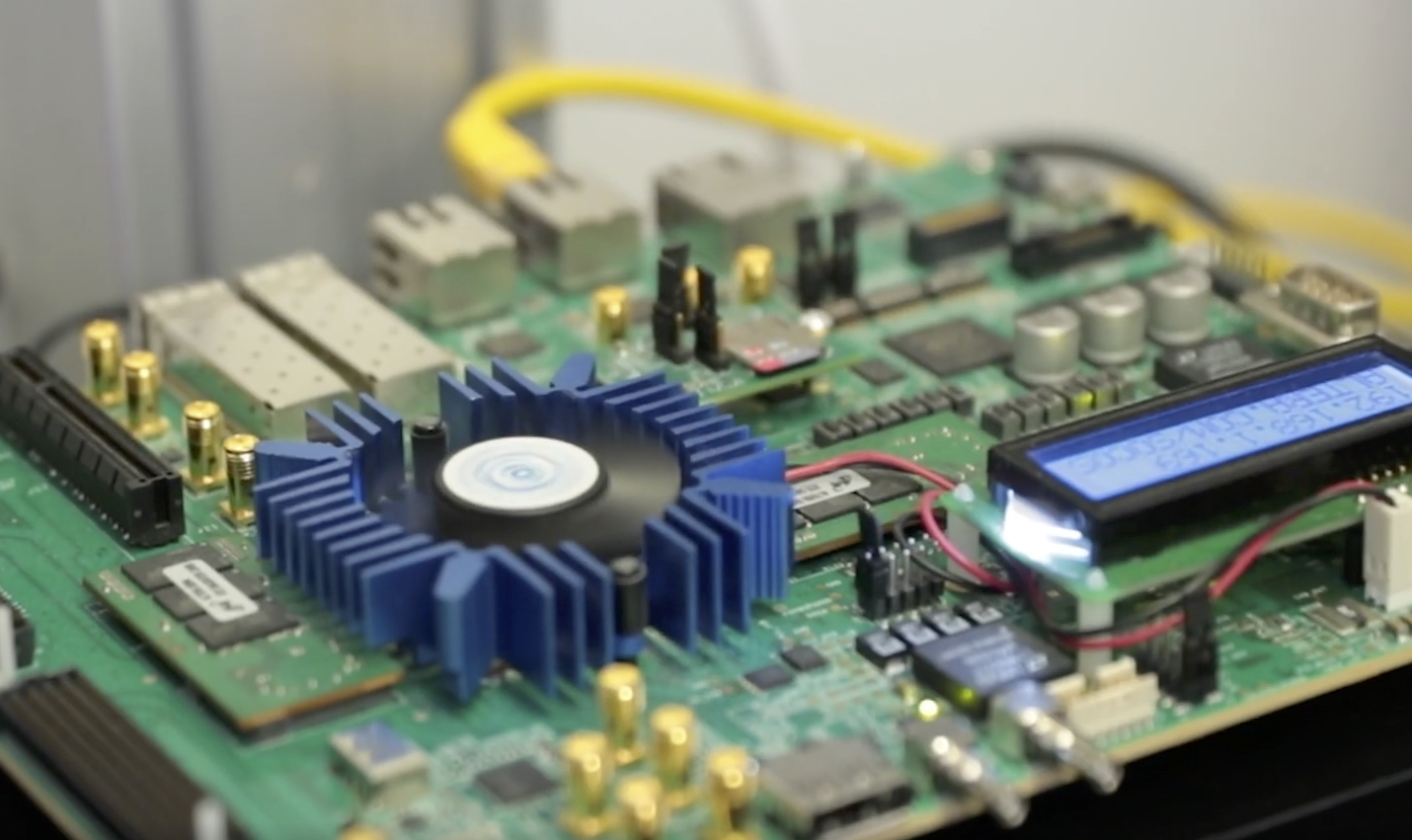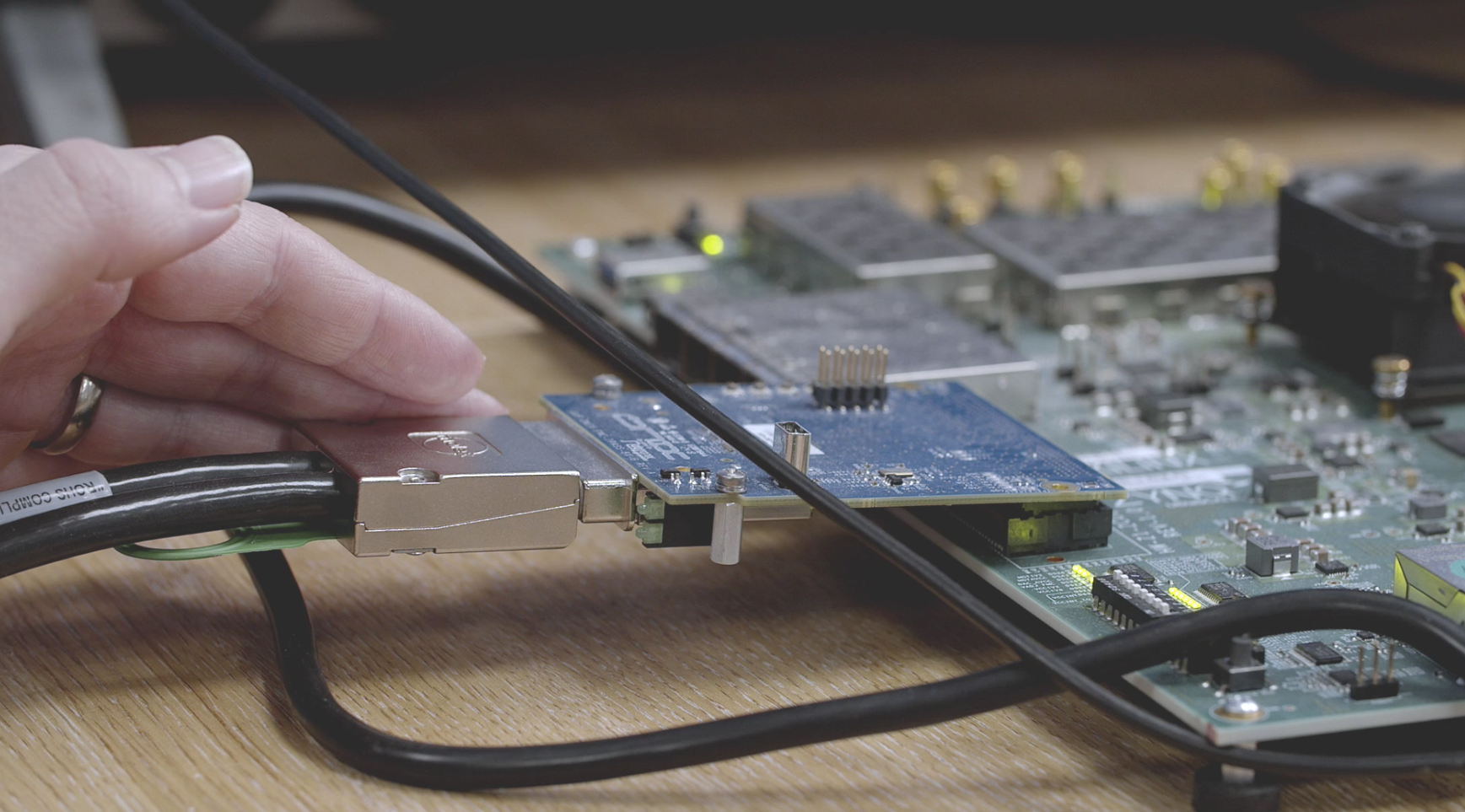Technology designed by University of Southampton spin-out AccelerComm is helping to lay the foundations for the next generation of faster, more reliable wireless communications.
Rob Maunder, Professor of Wireless Communication and AccelerComm’s Founder and Chief Technology Officer, talks about the company’s journey since its formation in 2016 and how taking his research from academia to industry has enriched his career.

What does AccelerComm do?
We design components for the signal processing used in wireless communication systems, currently with a particular focus on 5G (fifth generation wireless technology). We’re an intellectual property (IP) company, so we license our designs to other companies who make them into chips to integrate into their systems, rather than manufacturing them ourselves.
How does your technology support 5G?
To achieve the ambitions of 5G, communication technologies require processors designed specifically for the job, rather than running software on generic processors.
5G has three pillars. One is enhanced mobile broadband, which, for example, will allow smartphones to download data much more quickly, and enable many more smartphones to work in the same place at the same time. The second is massive machine communication, to enable Internet of Things devices to work anywhere in the world where 5G is deployed. The third pillar is ultra-reliable low-latency communication, for systems where an extremely high-quality, dependable signal is critical, such as self-driving cars.
Our work is about enabling these three pillars to happen. Each one involves different challenges and demands, so our approach is to design our technology in a scalable way, so we can adjust it to meet the requirements of different scenarios and different customers.
What impact has this technology had so far?
In four and a half years we have designed 27 products and we’ve had 58 ‘design wins’ with 12 customers – where a customer pays us to use one of our products in their technology. Those customers range from the big phone networks to chip companies and manufacturers of phones and other connected devices. Other customers want to use our IP in their own proprietary systems, for example for underwater and satellite communication.
One example is National Instruments, a test and measurement equipment company that is incorporating our technology into its products, which will in turn be used by wireless researchers in academic and industrial teams to accelerate product development.

What does your role as Chief Technology Officer involve?
I get my hands dirty doing work on the software side of the company, but I also focus on AccelerComm’s technology strategy, setting the future direction and building roadmaps for the capabilities, performance and features we want to have in our products. I’m heavily involved in investment raising as part of the pitching team, and I represent the company at conferences and trade shows.
I still work at the University too, spending one day a week in my academic role.
Why did you choose to take the commercial route?
I have an inherent interest in doing research that has impact, and starting a company is an effective way to get research out into the real world. Also, in the last decade there has been a growing government focus on impact; universities’ research funding levels are based on measures of impact. This shift happened at a formative stage in my career, so it’s something I’ve really taken on board.
What is the enterprise environment like at Southampton?
It’s very conducive. The University’s Research and Innovation Services (RIS) has lots of experience of generating spin-out companies. There is an on-campus new business accelerator, Future Worlds, and the University is a partner in the SETsquared start-up programme. In addition, the academic appraisal process recognises and rewards contributions to enterprise.
My department, Electronics and Computer Science (ECS), has lots of links with industry, which allows us to have discussions about how our research could solve problems in real life, with the people who really know. In ECS there is also a research group, the IT Innovation Centre, that is dedicated to bringing research closer to practice.

Did you tap into the support on offer during AccelerComm’s journey?
For us the first stepping stone was to file a patent for our research. We were asking the University to cover the cost, so RIS asked us to present our work and justify its commercial potential. That early contact with RIS meant we received mentoring, and it gave us the motivation to pursue opportunities to develop the impact of the patent.
I accessed Researcher to Innovator support and the Innovation to Commercialisation of University Research (ICURe) programme, led by the University with the SETsquared partnership. We received funding to travel around the world and speak to 100 different companies and individuals who were stakeholders in our area of research. It also provided training which helped us to write a business plan.
We had support on pitching from Future Worlds, which helped us think about how to articulate our technology and business plan in a way that would bring it to life for stakeholders. Future Worlds also introduced us to a mentor who helped us to develop our pitch, and later supported us with negotiations following a successful pitch to Innovate UK for a start-up grant in 2016.
How has the company developed since?
We’ve grown exponentially over the past few years. Initially we had two tranches of £250,000 from IP Group, which invests in university spin-outs. Then in 2018 we raised £2.5m, some from IP Group and some from Bloc Ventures, which focuses on communication technologies. Last autumn, we received a further £5.8m in Series A funding round led by IQ Capital alongside Bloc Ventures and the IP Group.
That has enabled us to grow the team to 35 people, including senior industry engineers, senior academics and graduate researchers, so we have a balance of background and experience.
Starting a company has pushed me out of my comfort zone and kept me out of it for the last four and a half years, giving me more personal development than I could ever have imagined. It has really benefited my career.

How has starting a company contributed to your own development?
It has pushed me out of my comfort zone and kept me out of it for the last four and a half years, giving me more personal development than I could ever have imagined. It has really benefited my career – I was promoted to professor and my enterprise activities were a big contributor to that. I have been able to make contacts in industry all around the world, and that benefits my research hugely; it means I can focus my research on real industry problems.
What challenges did you face along the way?
It has been a rollercoaster of emotions, with fantastic highs and lows as well. I think that’s true of any start-up. There have been times when in retrospect I was too optimistic or too pessimistic. I hope now that I’ve got the right balance.
For me, another challenge was adapting from an academic mindset to an industrial one. I thought I knew what teamwork was, and I thought I knew what a deadline was, but when I started to work with industry colleagues I realised I didn’t really understand what those things were at all. Also, in academic research your product or idea has to work, but only under controlled conditions, whereas in industry it has to work under all conditions. So there’s a much greater focus on quality and provability.
What are the advantages to the University of AccelerComm’s spin-out success?
AccelerComm and the research behind it is the subject of an impact case study for the Research Excellence Framework (REF). This is a really important contribution as the University’s REF performance will dictate the level of research funding it receives, as well as having an impact on its reputation and position in the league tables.
Our close links provide opportunities to collaborate. We have worked together on publicly funded projects, with grants from Innovate UK, the Engineering and Physical Sciences Research Council, and a Knowledge Transfer Partnership. These have enabled research colleagues at the University to get involved in the company, so we get the benefit of their expertise and they benefit from greater exposure to industry.
How else does engagement with the University benefit AccelerComm?
Our association with the University brings us instant prestige. Southampton has a global reputation, so when we talk to companies around the world that reputation rubs off onto us. And, of course, the University is a source of talent we can recruit from – we’ve got a fantastic team that has come out of the University.
Does the company provide opportunities for Southampton students?
Students can benefit from placements and internships at AccelerComm, plus I still teach undergraduate and master’s students, and supervise PhD students, so I can bring my expertise and industry experience to their learning.
What’s next for AccelerComm?
Our most recent round of investment has given us a stable platform, which is allowing us to focus much more on strategy. Rather than saying yes to every customer opportunity, we are now able to carefully consider how each opportunity fits into our long term strategy. In this way, we can keep focus on the big prize of creating must-have products that drive the performance of 5G across the whole industry.
What advice would you give to other academics who are thinking about commercialising their research?
At the start of this process I was worried that I would put a lot of time into enterprise activity and it might come to nothing – it seemed like a big risk. But when I reflect back on it, I realise that I was learning so much that even if it had come to nothing, that learning would have been worth it on its own. So there’s no risk at all. That’s the message I’d like to share with other academics who are thinking about engaging in enterprise but are worried about the career impact. The only career impact you can expect is positive.